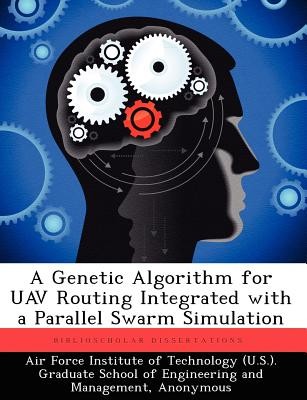
- We will send in 10–14 business days.
- Author: Matthew A Russell
- Publisher: BiblioScholar
- ISBN-10: 1249358531
- ISBN-13: 9781249358534
- Format: 18.9 x 24.6 x 1.3 cm, softcover
- Language: English
- SAVE -10% with code: EXTRA
A Genetic Algorithm for Uav Routing Integrated with a Parallel Swarm Simulation (e-book) (used book) | bookbook.eu
Reviews
Description
This research investigation addresses the problem of routing and simulating swarms of UAVs. Sorties are modeled as instantiations of the NP-Complete Vehicle Routing Problem, and this work uses genetic algorithms (GAs) to provide a fast and robust algorithm for a priori and dynamic routing applications. Swarms of UAVs are modeled based on extensions of Reynolds' swarm research and are simulated on a Beowulf cluster as a parallel computing application using the Synchronous Environment for Emulation and Discrete Event Simulation (SPEEDES). In a test suite, standard measures such as benchmark problems, best published results, and parallel metrics are used as performance measures. The GA consistently provides efficient and effective results for a variety of VRP benchmarks. Analysis of the solution quality over time verifies that the GA exponentially improves solution quality and is robust to changing search landscapes making it an ideal tool for employment in UAV routing applications. Parallel computing metrics calculated from the results of a PDES show that consistent speedup (almost linear in many cases) can be obtained using SPEEDES as the communication library for this UAV routing application. Results from the routing application and parallel simulation are synthesized to produce a more advanced model for routing UAVs.
EXTRA 10 % discount with code: EXTRA
The promotion ends in 19d.21:58:16
The discount code is valid when purchasing from 10 €. Discounts do not stack.
- Author: Matthew A Russell
- Publisher: BiblioScholar
- ISBN-10: 1249358531
- ISBN-13: 9781249358534
- Format: 18.9 x 24.6 x 1.3 cm, softcover
- Language: English English
This research investigation addresses the problem of routing and simulating swarms of UAVs. Sorties are modeled as instantiations of the NP-Complete Vehicle Routing Problem, and this work uses genetic algorithms (GAs) to provide a fast and robust algorithm for a priori and dynamic routing applications. Swarms of UAVs are modeled based on extensions of Reynolds' swarm research and are simulated on a Beowulf cluster as a parallel computing application using the Synchronous Environment for Emulation and Discrete Event Simulation (SPEEDES). In a test suite, standard measures such as benchmark problems, best published results, and parallel metrics are used as performance measures. The GA consistently provides efficient and effective results for a variety of VRP benchmarks. Analysis of the solution quality over time verifies that the GA exponentially improves solution quality and is robust to changing search landscapes making it an ideal tool for employment in UAV routing applications. Parallel computing metrics calculated from the results of a PDES show that consistent speedup (almost linear in many cases) can be obtained using SPEEDES as the communication library for this UAV routing application. Results from the routing application and parallel simulation are synthesized to produce a more advanced model for routing UAVs.


Reviews